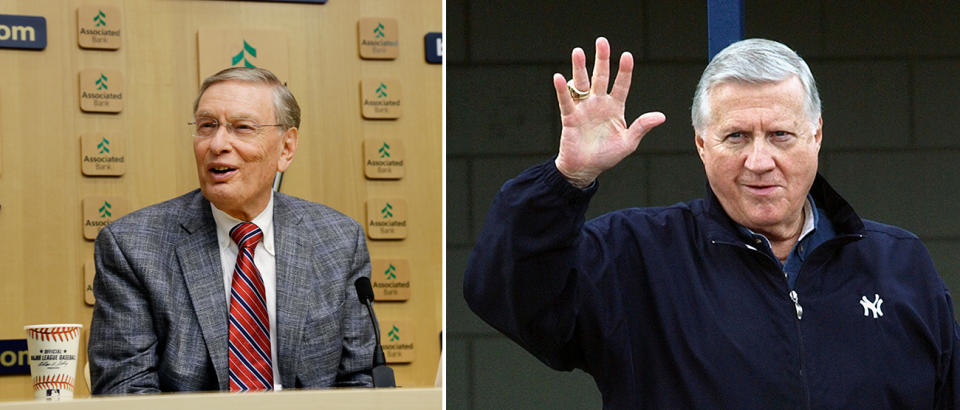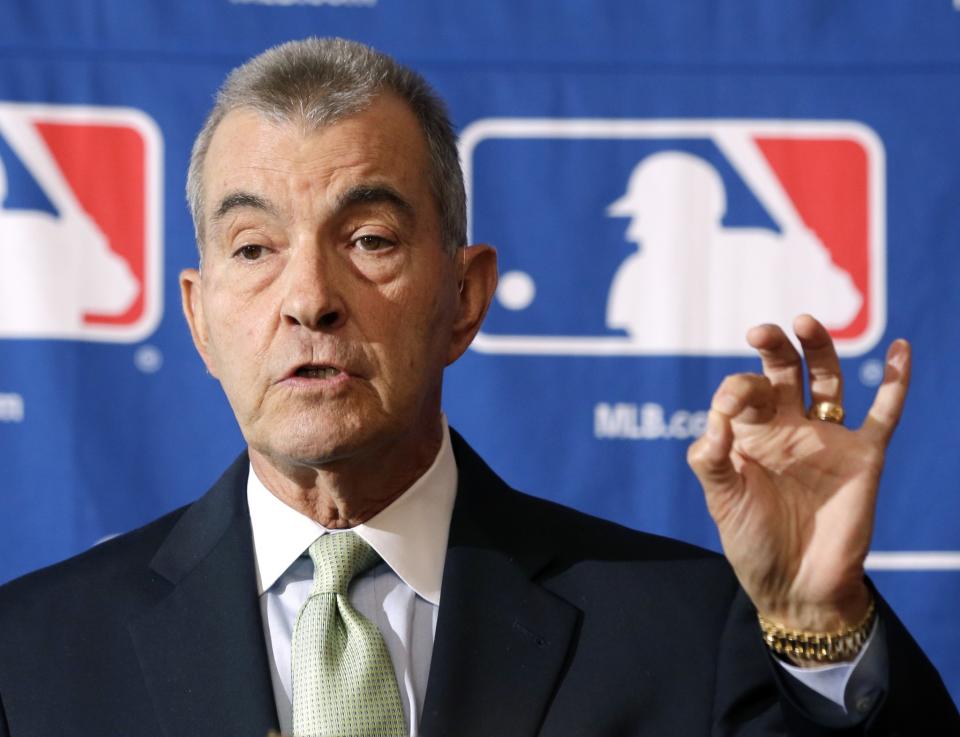Do Bud Selig and George Steinbrenner belong in the Hall of Fame?
NATIONAL HARBOR, Md. — Most years, the Veterans Committee voting for the Hall of Fame is an exercise that involves digging deep into the past. Not so this year, as the committee will vote Sunday on the Hall of Fame cases of some rather familiar names, including Bud Selig, Mark McGwire, Albert Belle and George Steinbrenner.
This is the first year of the Hall of Fame’s Today’s Game ballot, which aims to consider more modern candidates. It’s one of the four rotating committees that was born when the Veterans Committee system we knew was overhauled last year. The other era ballots that will follow in coming years: Modern Baseball (1970-87), Golden Days (1950-69) and Early Baseball (1871-1949).
This year’s vote will happen Sunday as people begin to arrive here for baseball’s Winter Meetings, which officially begin Sunday night and get busier Monday. The results of the vote — by a 16-person panel of Hall of Famers, former executives and veteran baseball writers — will be announced on MLB Network at 6 p.m. ET. A press conference will follow Monday featuring any living members who were elected. Candidates need 75 percent of the votes for election.
Here’s a look at all 10 names on the ballot:
• Harold Baines: Ranks 32nd all-time in RBIs after 22-year career.
• Albert Belle: Nine straight 100-RBI seasons, five-time All-Star.
• Will Clark: Six-time All-Star, .303 career batting average.
• Orel Hershiser: 1988 Cy Young winner, 204 career wins.
• Davey Johnson: Managed 17 years (including 1986 Mets) and played for 13 years.
• Mark McGwire: 583 career homers, including his famed 1998 season when he hit 70.
• Lou Piniella: 23-year career as MLB manager, 1,835 wins.
• John Schuerholz: First GM to lead teams to World Series in AL and NL.
• Bud Selig: MLB commissioner from 1992-2015.
• George Steinbrenner: Famed New York Yankees owner.
The easiest way to dissect this ballot is by starting with the six players and being blunt: None of them deserve to be in the Hall of Fame. They were all very good players — all Hall of Very Good guys — but not a one of them has a career value that exceeds the average Hall of Famer at their position.
Using the JAWS method, developed by Jay Jaffe of Sports Illustrated, which gives a position-by-position value for Hall of Famers, McGwire is the closest. His JAWS score is 51.9 and the average first baseman in the Hall of Fame is at 54.2. Belle, for instance, has a 37.9 JAWS ranking compared to 53.3 at his position. As such, he fell off the BBWAA Hall of Fame ballot after his second year in 2007 when he got just 3.5 percent of the vote.
Neither manager on the ballot has a particularly strong case either. Johnson and Pinella both had long and successful careers, but only one World Series a piece. Pinella has the better likelihood to get in, as his 1.835 wins rank 14th in history and 12 of the 13 skippers ahead of him are in, but he’s not exactly a sure thing.
That leaves the executive branch of this Hall of the Fame ballot as the most fascinating: Selig and Steinbrenner, of course, are names that everyone knows (and probably has an opinion about). And Schuerholz isn’t exactly a household name, but you could make a good Cooperstown argument on his behalf. So let’s dig into all three a bit:
John Schuerholz
Even if the Hall of Fame doesn’t take him, Schuerholz has this claim to fame that no other executive can match: He was the first GM to win a World Series in both the AL and NL, with the 1985 Kansas City Royals and the 1995 Atlanta Braves.
Schuerholz was the Royals GM from 1982-1990, but really made his mark in Atlanta, where he was GM from 1990-2007 and the chief architect of their dynasty. The team won its division ever year but once between 1991 and 2005. The team didn’t win as many as World Series as it probably should have, just that one in 1995, but that doesn’t tarnish Schuerholz’s legacy.
There aren’t dozens and dozens of GMs in the Hall of Fame, so the basis for how Schuerholz compares is tougher to gauge than players. But many experts think Schuerholz has a good chance to get 75 percent of the vote.
Bud Selig
The chatter around Selig’s Hall of Fame candidacy this week makes it sound like he’s a sure-thing electee. The ex-commissioner — who held the position from 1992 to 2015, first in an acting role and then officially — is still fresh in our minds since his reign ended not too long ago. Evaluating a commissioner, like evaluating an executive, is tougher than a player and Selig might have an even cloudier case.
Selig had the second longest run of any MLB commissioner and was effective if not necessarily loved. He helped propel baseball to a new level of financially prosperous (it generated $9.5 billion in his final season, the 13th straight year revenues increased, up from $1.9 billion in 1993) but he’s also been routinely criticized for looking the other way when steroids took over baseball. The other big black eye on his time as commissioner is the 1994 strike.
But Selig’s legacy includes many sweeping changes: four new franchises, the addition of interleague play, the adoption of instant replay, more than a dozen new stadiums and the creation of the World Baseball Classic. His fingerprints are all over the game we know today.
George Steinbrenner
If fame were the only requirement for getting in the Hall of Fame, Steinbrenner would have been in long ago. What Steinbrenner did in baseball is what Vince McMahon did in pro wrestling — ownership with a side of showmanship. Steinbrenner’s teams won, which was always his main goal, but his legacy in baseball isn’t so easily to reconcile.
Steinbrenner owned the Yankees from 1973 until his death in 2010. In that time, his Yankees teams won seven World Series and 11 pennants. To get those type of results, The Boss was famously willing to spend crazy amounts of money or fire anybody who he thought stood in the way.
That’s one side of the Steinbrenner story. On the other side: he was suspended from MLB twice, including once that he was banned for life (it was overturned three years later). He was more outspoken than refined, more bluster than luster. But that was Steinbrenner’s way.
And it makes him probably the most intriguing name on this ballot. Most certainly he’s a part of baseball history, but he’s another of the cases we’ve wrestled with the past decade with people like Barry Bonds and Roger Clemens. Even with all the baggage, is he a Hall of Famer?
More MLB coverage from Yahoo Sports:
Mike Oz is the editor of Big League Stew on Yahoo Sports. Have a tip? Email him at mikeozstew@yahoo.com or follow him on Twitter! Follow @MikeOz

 Yahoo Sports
Yahoo Sports 




